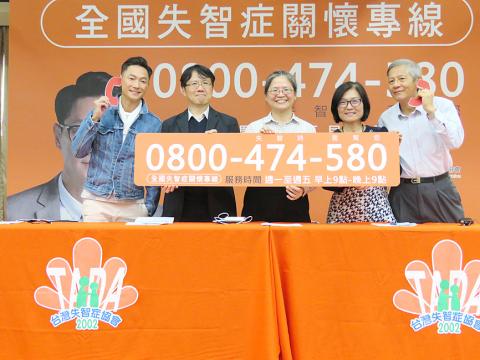The Ministry of Health and Welfare and the Taiwan Alzheimer Disease Association are jointly establishing a call center to help families of those with dementia, as use of an existing hotline has increased in recent years.
The call center, which would operate from 9am to 9pm from Monday to Friday, is intended to lessen the burden of families of the 280,000 people nationwide who have Alzheimer’s disease or other conditions that lead to dementia, the ministry said. In recent years, more people are developing early-onset dementia — when the condition arises in those 65 years old and under — and their family members are seeking help in caring for them, it said.
The jointly run call center would be available through the existing dementia hotline (0800-474-580), and would provide additional support for the families of younger dementia sufferers, it said.

Photo provided by the Taiwan Alzheimer’s Disease Association
The hotline, which has been in service for 10 years, has seen a four-fold increase in callers seeking help with early-onset dementia in comparison with six years ago, when the number of callers began to noticeably increase, association secretary-general Tang Li-yu (湯麗玉) said.
From January to October this year, it received 5,774 calls, 483 of which were for early-onset dementia.
The number of questions per caller was also higher on average for those helping younger family members, she said, adding that they received an average of 3.36 questions per caller about younger people with dementia, compared with 2.1 questions per average from other callers. Those helping younger people with dementia also spent longer on the phone on average, indicating that the issues these families face are more abundant and more complicated, she said.
Some of the problematic behaviors those with dementia exhibit include quick tempers, anxiousness and repetitive behavior, which family members are often unequipped to handle or lack the appropriate knowledge to address, she said.
In about one-third of patients with early-onset dementia, memory loss does not appear as a symptom and the condition may take up to four years to accurately diagnose, National Taiwan University Hospital neurologist Chen Ta-fu (陳達夫) said.
Chen said those who notice middle-aged family members exhibiting significant changes in their sense of direction, use of language, emotional state, decisionmaking ability or personality should encourage them to seek medical consultation, as the changes may be a sign of the development of dementia.

The manufacture of the remaining 28 M1A2T Abrams tanks Taiwan purchased from the US has recently been completed, and they are expected to be delivered within the next one to two months, a source said yesterday. The Ministry of National Defense is arranging cargo ships to transport the tanks to Taiwan as soon as possible, said the source, who is familiar with the matter. The estimated arrival time ranges from late this month to early next month, the source said. The 28 Abrams tanks make up the third and final batch of a total of 108 tanks, valued at about NT$40.5 billion

Two Taiwanese prosecutors were questioned by Chinese security personnel at their hotel during a trip to China’s Henan Province this month, the Mainland Affairs Council (MAC) said yesterday. The officers had personal information on the prosecutors, including “when they were assigned to their posts, their work locations and job titles,” MAC Deputy Minister and spokesman Liang Wen-chieh (梁文傑) said. On top of asking about their agencies and positions, the officers also questioned the prosecutors about the Cross-Strait Joint Crime-Fighting and Judicial Mutual Assistance Agreement, a pact that serves as the framework for Taiwan-China cooperation on combating crime and providing judicial assistance, Liang

A group from the Taiwanese Designers in Australia association yesterday represented Taiwan at the Midsumma Pride March in Melbourne. The march, held in the St. Kilda suburb, is the city’s largest LGBTQIA+ parade and the flagship event of the annual Midsumma Festival. It attracted more than 45,000 spectators who supported the 400 groups and 10,000 marchers that participated this year, the association said. Taiwanese Designers said they organized a team to march for Taiwan this year, joining politicians, government agencies, professionals and community organizations in showing support for LGBTQIA+ people and diverse communities. As the first country in Asia to legalize same-sex

MOTIVES QUESTIONED The PLA considers Xi’s policies toward Taiwan to be driven by personal considerations rather than military assessment, the Epoch Times reports Chinese President Xi Jinping’s (習近平) latest purge of the Chinese People’s Liberation Army (PLA) leadership might have been prompted by the military’s opposition to plans of invading Taiwan, the Epoch Times said. The Chinese military opposes waging war against Taiwan by a large consensus, putting it at odds with Xi’s vision, the Falun Gong-affiliated daily said in a report on Thursday, citing anonymous sources with insight into the PLA’s inner workings. The opposition is not the opinion of a few generals, but a widely shared view among the PLA cadre, the Epoch Times cited them as saying. “Chinese forces know full well that